Nurses Narratives Staff Nurse Ethel M Biggs
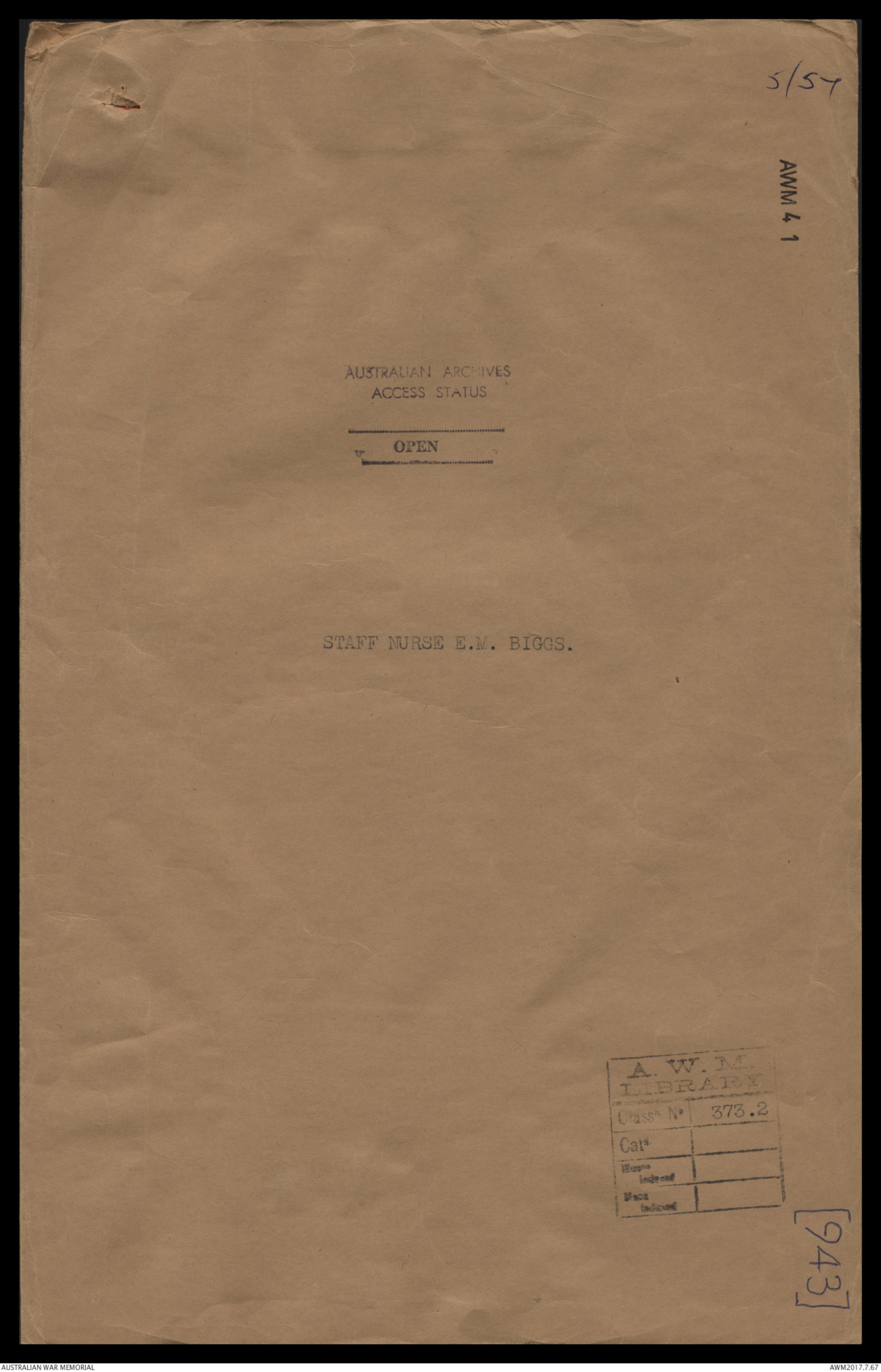
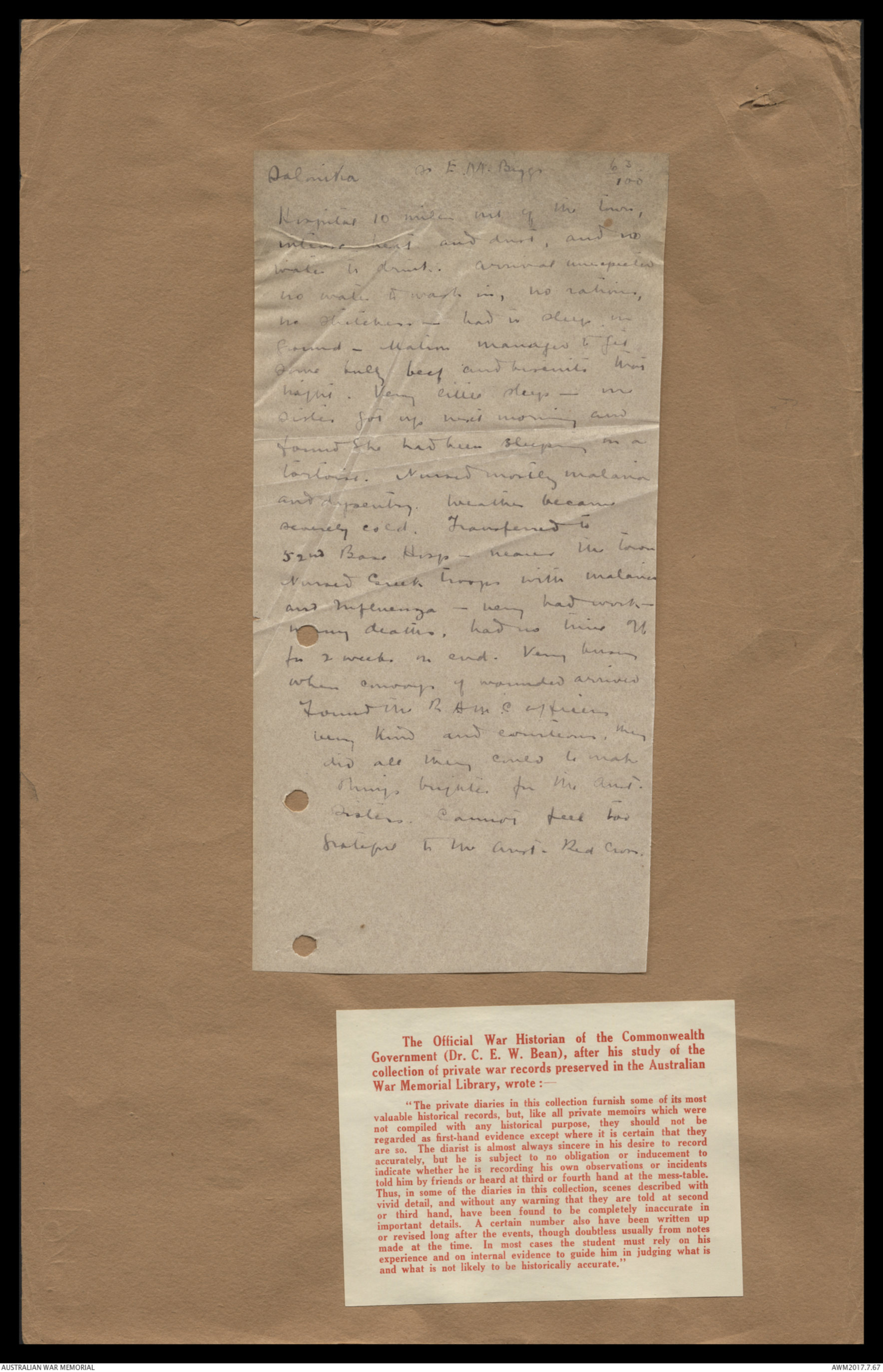
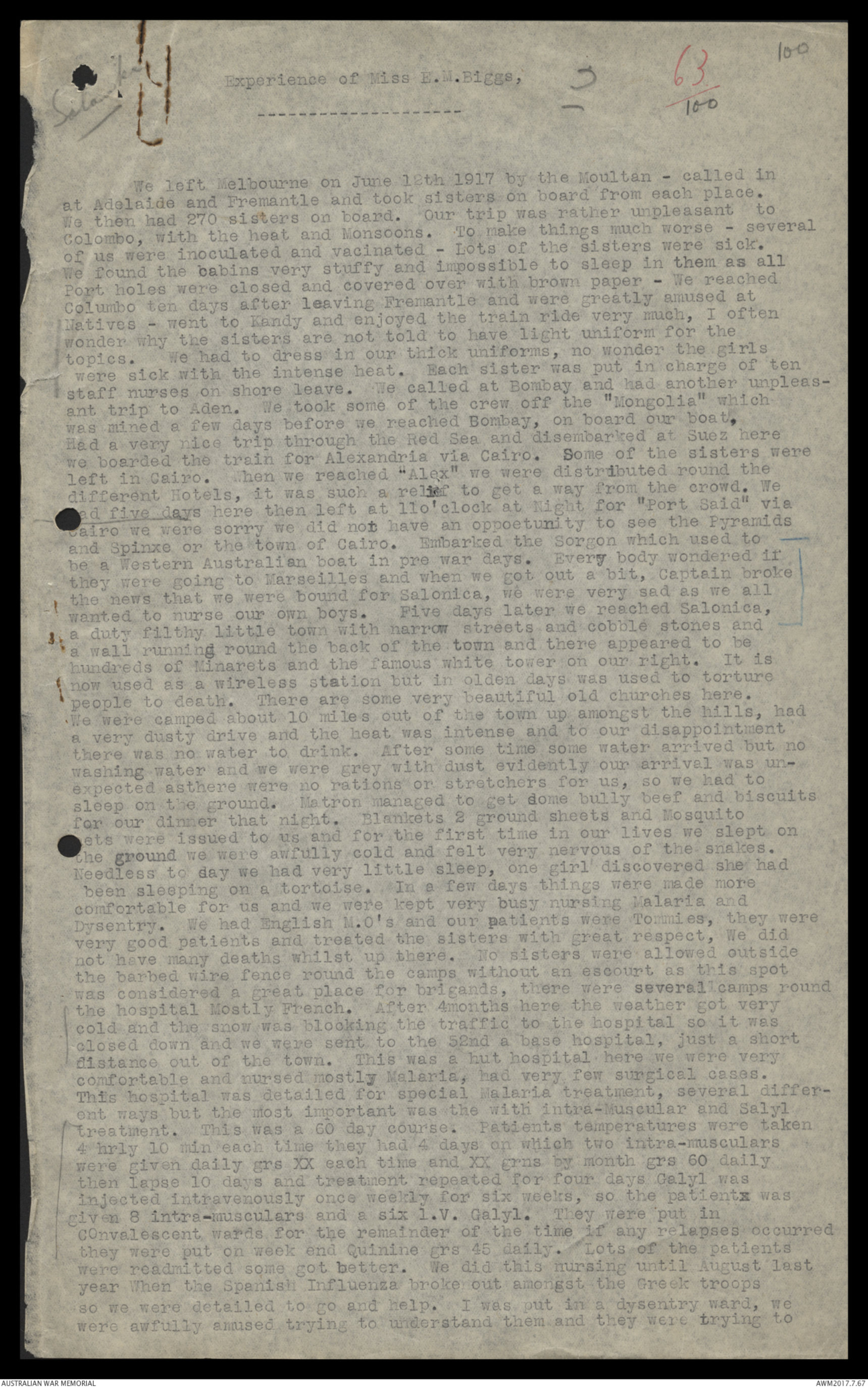
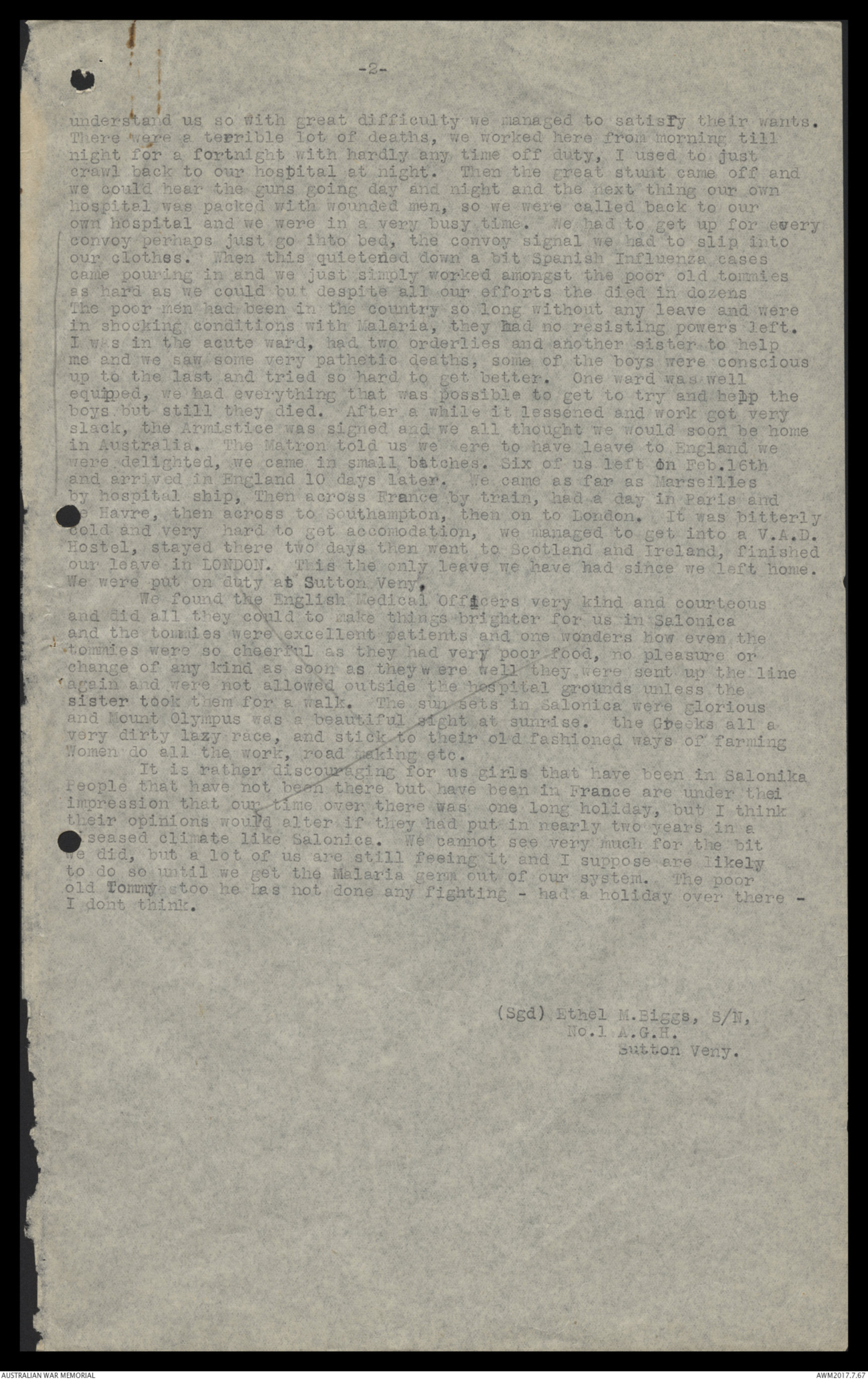
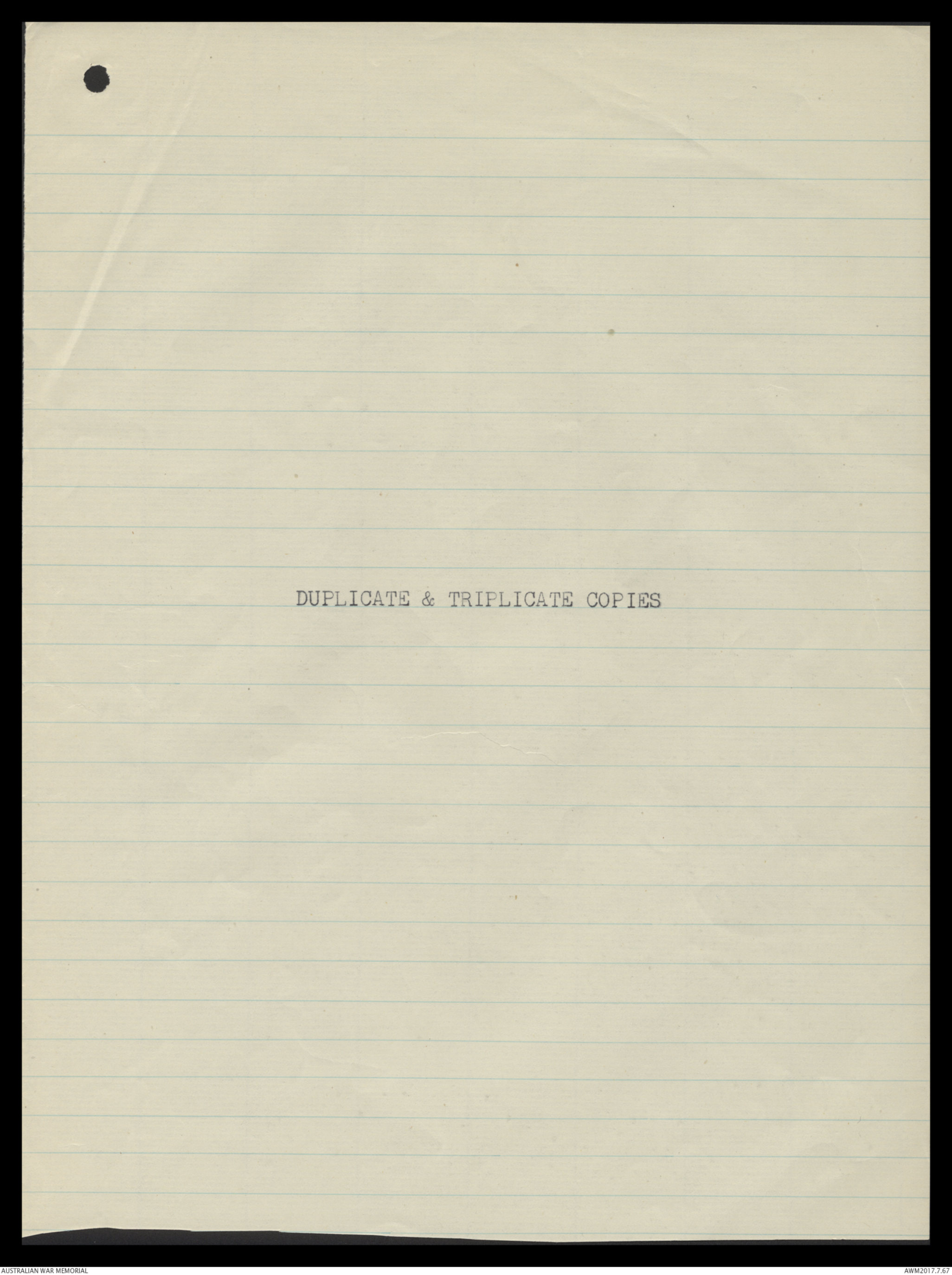
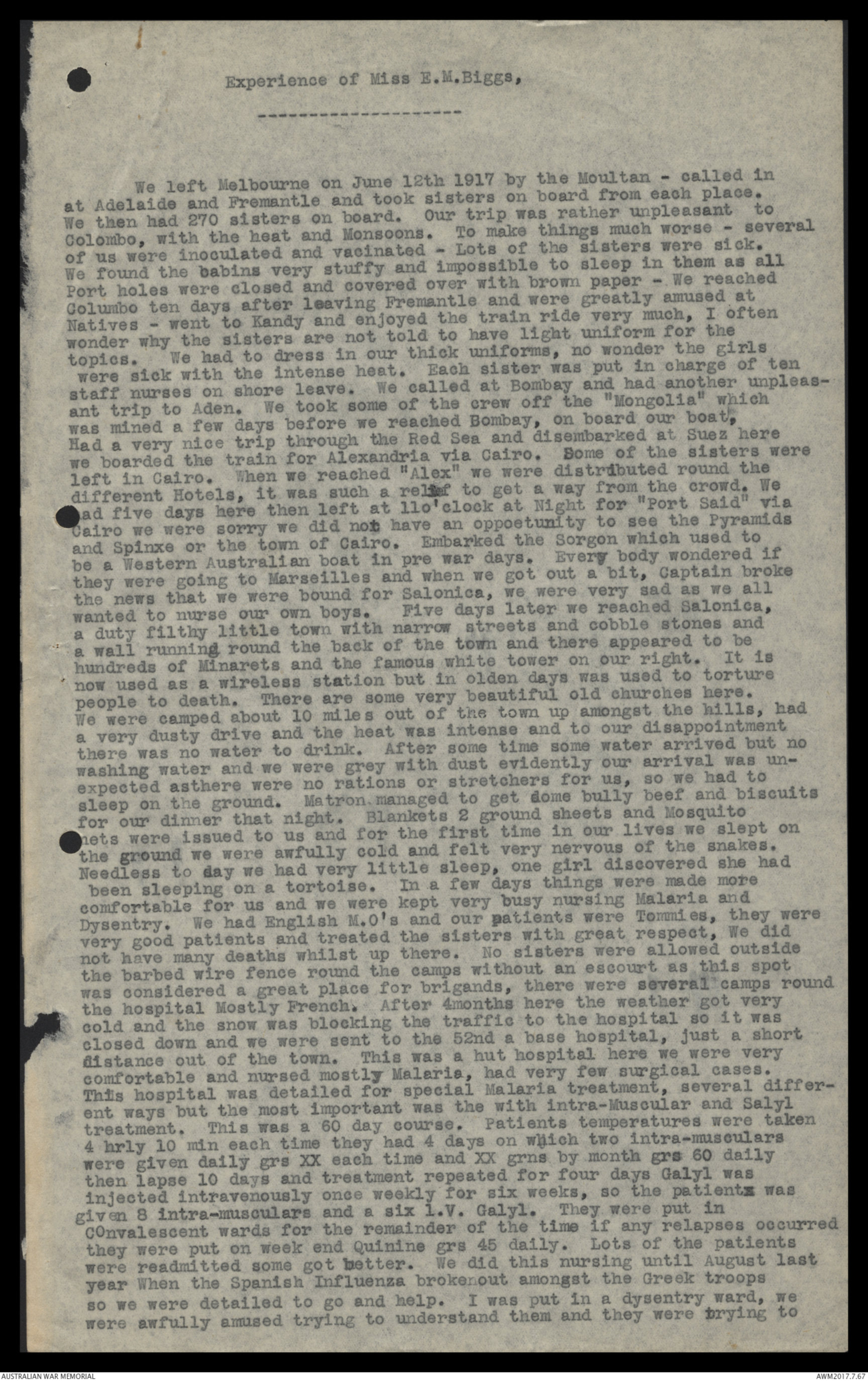
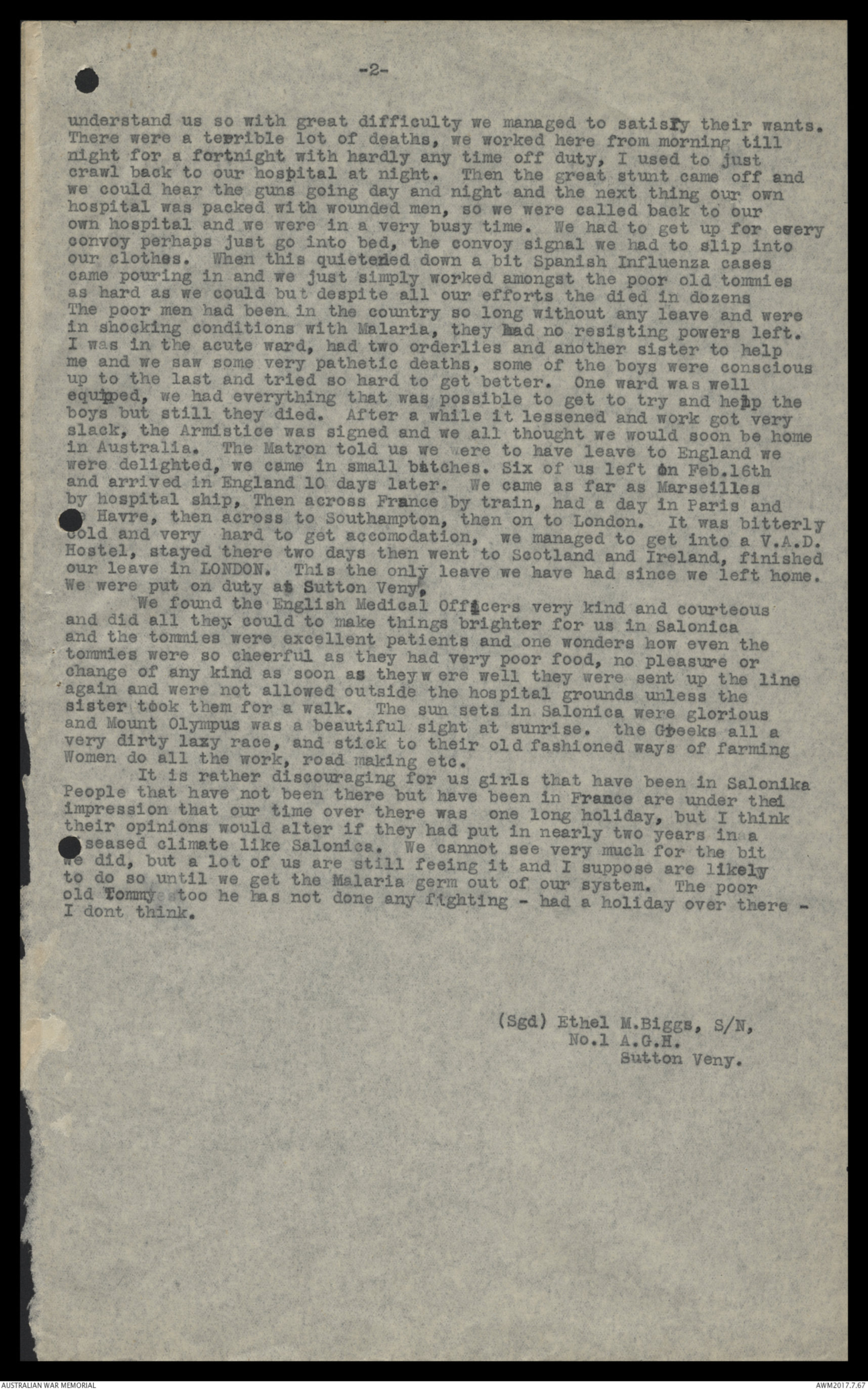
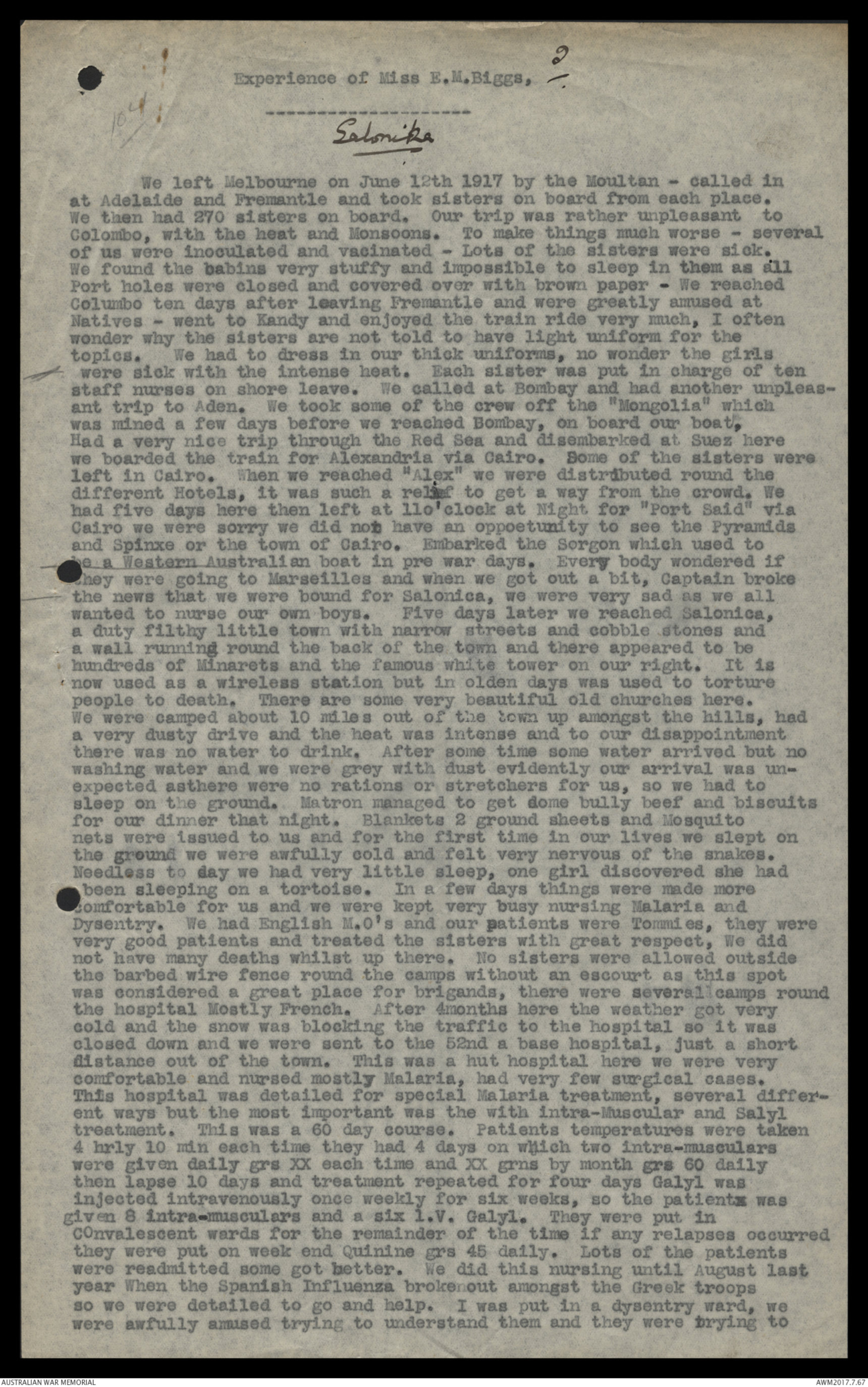
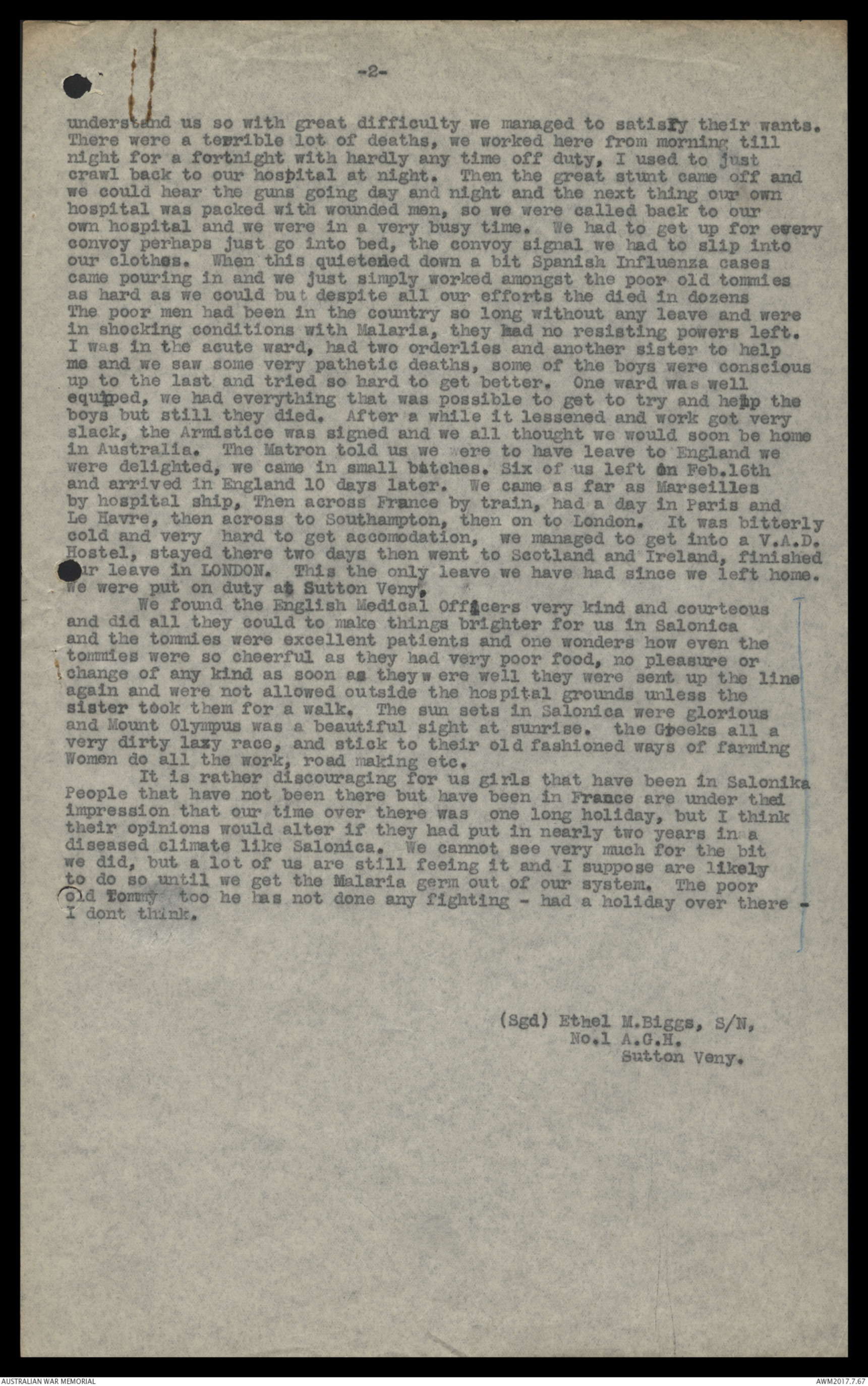
5/57
AWM 4 1
AUSTRALIAN ARCHIVES
ACCESS STATUS
OPEN
STAFF NURSE E.M. BIGGS.
Salonika Sr E.M. Biggs. 63/100
Hospital 10 miles out of the town,
intense heat and dust, and no
water to drink. Arrival unexpected
no water to wash in, no rations,
no stretchers - had to sleep on
ground - Matron managed to find
some bully beef and biscuits was
happy. Very little sleep- When
Sister got up next morning and
found she had been sleeping on a
tortoise. Nursed mostly malaria
and dysentery. Weather became
severely cold. Transferred to
52nd Base Hosp - nearer the town.
Nursed Greek troops with malaria
and influenza - very hard work -
many deaths, had no time off
for 2 weeks on end. Very busy
when convoys of wounded arrived
Found the RAMC officers
very kind and courteous, they
did all they could to make
things brighter for the Aust.
sisters. Cannot feel too
grateful to the Aust. Red Cross.
The Offical War Historian of the Commonwealth
Government (Dr. C. E. W. Bean), after his study of the
collection of private war records preserved in the Australian
War Memorial Library, wrote:-
"The private diaries in this collection furnish some of its most
valuable historical records, but, like all private memoirs which were
not compiled with any historical purpose, they should not be
regarded as first-hand evidence except where it is certain that they
are so. The diarist is almost always sincere in his desire to record
accurately, but he is subject to no obligation or inducement to
indicate whether he is recording his own observations or incidents
told him by friends or heard at third or fourth hand at the mess-table.
Thus, in some of the diaries in this collection, scenes described with
vivid detail, and without any warning that they are told at second
or third hand, have been found to be completely inaccurate in
important details. A certain number also have been written up
or revised long after the events, though doubtless usually from notes
made at the time. In most cases the student must rely on his
experience and on internal evidence to guide him in judging what is
and what is not likely to be historically accurate".
Experience of Miss E.M. Biggs,
We left Melbourne on June 12th 1917 by the Moultan - called in
at Adelaide and Fremantle and took sisters on board from each place.
We then had 270 sisters on board. Our trip was rather unpleasant to
Colombo, with the heat and Monsoons. To make things much worse - several
of us were inoculated and vacinated - Lots of the sisters were sick.
We found the cabins very stuffy and impossible to sleep in them as all
Port holes were closed and covered over with brown paper - We reached
Colombo ten days after leaving Fremantle and were greatly amused at
Natives - went to Kandy and enjoyed the train ride very much, often
wonder why the sisters are not told to have light uniform for the
topics. We had to dress in thick uniforms, no wonder the girls
were sick with the intense heat. Each sister was put in charge of ten
staff nurses on shore leave. We called at Bombay and had another unpleasant
trip to Aden. We took some of the crew off the "Mongolia" which
was mined a few days before we reached Bombay, on board our boat,
Had a very nice trip through the Red Sea and disembarked at Suez here
we boarded the train for Alexandria via Cairo. Some of the sisters were
left in Cairo. When we reached "Alex" we were distributed round the
different Hotels, it was such a relief to get away from the crowd. We
had five days here then left at 11 o'clock at Night for "Port Said" via
Cairo we were sorry we did not have an opportunity to see the Pyramids
and Spinxe or the town of Cairo. Embarked the Sorgon which used to
be a Western Australian boat in pre war days. Every body wondered if
they were going to Marseilles and when we got out a bit, Captain broke
the news that we were bound for Salonica, we were very sad as we all
wanted to nurse our own boys. Five days later we reached Salonica,
a duty filthy little town with narrow streets and cobble stones and
a wall running round the back of the town and there appeared to be
hundreds of Minarets and the famous white tower on our right. It is
now used as a wireless station but in olden days was used to torture
people to death. There are some very beautiful old churches here.
We were camped about 10 miles out of the town up amongst the hills, had
a very dusty drive and the heat was intense and to our disappointment
there was no water to drink. After some time water arrived but no
washing water and we were grey with dust evidently our arrival was unexpected
asthere was no rations or stretchers for us, so we had to
sleep on the ground. Matron managed to get some bully beef and biscuits
for our dinner that night. Blankets 2 ground sheets and Mosquito
nets were issued to us and for the first time in our lives we slept on
the ground we were awfully cold and felt very nervous of the snakes.
Needless to say we had very little sleep, one girl discovered she had
been sleeping on a tortoise. In a few days things were made more
comfortable for us and we were kept very busy nursing Malaria and
Dysentry. We had English M.O's and our patients were Tommies, they were
very good patients and treated the sisters with great respect, We did
not have many deaths whilst up there. No sisters were allowed outside
the barbed wire fence round the camps without an escort as this spot
was considered a great place for brigands, there were several camps round
the hospital mostly French. After 4months here the weather got very
cold and the snow was blocking the traffic to the hospital so it was
closed down and we were sent to the 52nd a base hospital, just a short
distance out of the town. This was a hut hospital here we were very
comfortable and nursed mostly Malaria, had very few surgical cases.
This hospital was detailed for special Malaria treatment, several different
ways but the most important was the with intra-Muscular and Salyl
treatment. This was a 60 day course. Patients temperatures were taken
4 hrly 10 min each time they had 4 days on which two intra-musculars
were given daily grs XX each time and XX grns by month grs 60 daily
then lapse 10 days and treatment repeated for four days Galyl was
injected intravenously once weekly for six weeks, so the patient was
given 8 intra-musculars and a six 1.V. Galyl. They were put in
Convalescent wards for the remainder of the time if any relapses occurred
they were put on week end Quinine grs 45 daily. Lots of the patients
were readmitted some got better. We did this nursing until August last
year When the Spanish Influenza broke out amongs the Greek troops
so we were detailed to go and help. I was put in a dysentry ward, we
were awfully amused trying to understand them and they were trying to
-2-
understand us so with great difficulty we managed to satisfy their wants.
There were a terrible lot of deaths, we worked here from morning till
night for a fortnight with hardly any time off duty, I used to just
crawl back to our hospital at night. Then the great stunt came off and
we could hear the guns going day and night and the next thing our own
hospital was packed with wounded men, so we were called back to our
own hospital and we were in a very busy time. We had to get up for every
convoy perhaps just go into bed, the covoy signal we had to slip into
our clothes. When this quietened down a bit Spanish Influenza cases
came pouring in and we just simply worked amongst the poor old tommies
as hard as we could but despite all our efforts the died in dozens
The poor men had been in the country so long without any leave and were
in shocking conditions with Malaria, they had no resisting powers left.
I was in the acute ward, had two orderlies and another sister to
me and we saw some very pathetic deaths, some of the boys were conscious
up to the last and tried so hard to get better. One ward was well
equipped, we had everything that was possible to get to try and help the
boys but still they died. After a while it lessened and work got very
slack, the Armistice was signed and we all thought we would soon be home
in Australia. The Matron told us we were to have leave to England we
were delighted, we came in small batches. Six of us left on Feb. 16th
and arrived in England 10 days later. We came as far as Marseilles
by hospital ship, Then across France by train, had a day in Paris and
Le Havre, then across to Southampton, then on to London. It was bitterly
cold and very hard to get accomodation, we managed to get into a V.A.D.
Hostel, stayed there two days then went to Scotland and Ireland, finished
our leave in LONDON. This the only leave we have had since we left home.
We were put on duty at Sutton Veny.
We found the English Medical Officers very kind and courteous
and did all they could to make things brighter for us in Salonica
and the tommies were excellent patients and one wonders how even the
tommies were so cheerful as they had very poor food, no pleasure or
change of any kind as soon as they were all well they were sent up the line
again and were not allowed outside the hospital grounds unless the
sister took them for a walk. The sun sets in Salonica were glorious
and Mount Olympus was a beautiful sight at sunrise. the Greeks all a
very dirty lazy race, and stick to their old fashioned ways of farming
Women do all the work, road making etc.
It is rather discouraging for us girls that have been in Salonika
People that have not been there but have been in France are under the
impression that our time over there was one long holiday, but I think
their opinions would alter if they had put in nearly two years in a
diseased climate like Salonica. We cannot see very much for the bit
we did, but a lot of us are still feeing it and I suppose are likely
to do so until we get the Malaria germ out of our system. The poor
old Tommy too he has not done any fighting-had a holiday over there-
I dont think.
(Sgd) Ethel M. Biggs, S/N,
No. 1 A.G.H.
Sutton Veny.
DUPLICATE & TRIPLICATE COPIES
Experience of Miss E.M. Biggs,
We left Melbourne on June 12th 1917 by the Moultan-called in
at Adelaide and Fremantle and took sisters on board from each place.
We then had 270 sisters on board. Our trip was rather unpleasant to
Colombo, with the heat and Monsoons. To make things much worse-several
of us were inoculated and vacinated-Lots of the sisters were sick.
We found the cabins very stuffy and impossible to sleep in them as all
Port holes were closed and covered over with brown paper-We reached
Colombo ten days after leaving Fremantle and were greatly amused at
Natives-went to Kandy and enjoyed the train ride very much, often
wonder why the sisters are not told to have light uniform for the
topics. We had to dress in thick uniforms, no wonder the girls
were sick with the intense heat. Each sister was put in charge of ten
staff nurses on shore leave. We called at Bombay and had another unpleas-
ant trip to Aden. We took some of the crew off the "Mongolia" which
was mined a few days before we reached Bombay, on board our boat,
Had a very nice trip through the Red Sea and disembarked at Suez here
we boarded the train for Alexandria via Cairo. Some of the sisters were
left in Cairo. When we reached "Alex" we were distributed round the
different Hotels, it was such a relief to get away from the crowd. We
had five days here then left at 11 o'clock at Night for "Port Said" via
Cairo we were sorry we did not have an opportunity to see the Pyramids
and Spinxe or the town of Cairo. Embarked the Sorgon which used to
be a Western Australian boat in pre war days. Every body wondered if
they were going to Marseilles and when we got out a bit, Captain broke
the news that we were bound for Salonica, we were very sad as we all
wanted to nurse our own boys. Five days later we reached Salonica,
a duty filthy little town with narrow streets and cobble stones and
a wall running round the back of the town and there appeared to be
hundreds of Minarets and the famous white tower on our right. It is
now used as a wireless station but in olden days was used to torture
people to death. There are some very beautiful old churches here.
We were camped about 10 miles out of the town up amongst the hills, had
a very dusty drive and the heat was intense and to our disappointment
there was no water to drink. After some time water arrived but no
washing water and we were grey with dust evidently our arrival was un-
expected asthere was no rations or stretchers for us, so we had to
sleep on the ground. Matron managed to get some bully beef and biscuits
for our dinner that night. Blankets 2 ground sheets and Mosquito
nets were issued to us and for the first time in our lives we slept on
the ground we were awfully cold and felt very nervous of the snakes.
Needless to say we had very little sleep, one girl discovered she had
been sleeping on a tortoise. In a few days things were made more
comfortable for us and we were kept very busy nursing Malaria and
Dysentry. We had English M.O's and our patients were Tommies, they were
very good patients and treated the sisters with great respect, We did
not have many deaths whilst up there. No sisters were allowed outside
the barbed wire fence round the camps without an escort as this spot
was considered a great place for brigands, there were several camps round
the hospital mostly French. After 4months here the weather got very
cold and the snow was blocking the traffic to the hospital so it was
closed down and we were sent to the 52nd a base hospital, just a short
distance out of the town. This was a hut hospital here we were very
comfortable and nursed mostly Malaria, had very few surgical cases.
This hospital was detailed for special Malaria treatment, several differ-
ent ways but the most important was the with intra-Muscular and Salyl
treatment. This was a 60 day course. Patients temperatures were taken
4 hrly 10 min each time they had 4 days on which two intra-musculars
were given daily grs XX each time and XX grns by month grs 60 daily
then lapse 10 days and treatment repeated for four days Galyl was
injected intravenously once weekly for six weeks, so the patient was
given 8 intra-musculars and a six 1.V. Galyl. They were put in
Convalescent wards for the remainder of the time if any relapses occurred
they were put on week end Quinine grs 45 daily. Lots of the patients
were readmitted some got better. We did this nursing until August last
year When the Spanish Influenza broke out amongs the Greek troops
so we were detailed to go and help. I was put in a dysentry ward, we
were awfully amused trying to understand them and they were trying to
2
understand us so with great difficulty we managed to satisfy their wants.
There were a terrible lot of deaths, we worked here from morning till
night for a fortnight with hardly any time off duty, I used to just
crawl back to our hospital at night. Then the great stunt came off and
we could hear the guns going day and night and the next thing our own
hospital was packed with wounded men, so we were called back to our
own hospital and we were in a very busy time. We had to get up for every
convoy perhaps just go into bed, the covoy signal we had to slip into
our clothes. When this quietened down a bit Spanish Influenza cases
came pouring in and we just simply worked amongst the poor old tommies
as hard as we could but despite all our efforts the died in dozens
The poor men had been in the country so long without any leave and were
in shocking conditions with Malaria, they had no resisting powers left.
I was in the acute ward, had two orderlies and another sister to
me and we saw some very pathetic deaths, some of the boys were conscious
up to the last and tried so hard to get better. One ward was well
equipped, we had everything that was possible to get to try and help the
boys but still they died. After a while it lessened and work got very
slack, the Armistice was signed and we all thought we would soon be home
in Australia. The Matron told us we were to have leave to England we
were delighted, we came in small batches. Six of us left on Feb. 16th
and arrived in England 10 days later. We came as far as Marseilles
by hospital ship, Then across France by train, had a day in Paris and
Le Havre, then across to Southampton, then on to London. It was bitterly
cold and very hard to get accomodation, we managed to get into a V.A.D.
Hostel, stayed there two days then went to Scotland and Ireland, finished
our leave in LONDON. This the only leave we have had since we left home.
We were put on duty at Sutton Veny.
We found the English Medical Officers very kind and courteous
and did all they could to make things brighter for us in Salonica
and the tommies were excellent patients and one wonders how even the
tommies were so cheerful as they had very poor food, no pleasure or
change of any kind as soon as they were all well they were sent up the line
again and were not allowed outside the hospital grounds unless the
sister took them for a walk. The sun sets in Salonica were glorious
and Mount Olympus was a beautiful sight at sunrise. the Greeks all a
very dirty lazy race, and stick to their old fashioned ways of farming
Women do all the work, road making etc.
It is rather discouraging for us girls that have been in Salonika
People that have not been there but have been in France are under the
impression that our time over there was one long holiday, but I think
their opinions would alter if they had put in nearly two years in a
diseased climate like Salonica. We cannot see very much for the bit
we did, but a lot of us are still feeing it and I suppose are likely
to do so until we get the Malaria germ out of our system. The poor
old Tommy too he has not done any fighting-had a holiday over there-
I dont think.
(Sgd) Ethel M. Biggs, S/N,
No. 1 A.G.H.
Sutton Veny.
Experience of Miss E.M.Biggs,
Salonika
We left Melbourne on June 12th 1917 by the Moultan-called in
at Adelaide and Fremantle and took sisters on board from each place.
We then had 270 sisters on board. Our trip was rather unpleasant to
Colombo, with the heat and Monsoons. To make things much worse-several
of us were inoculated and vacinated-Lots of the sisters were sick.
We found the cabins very stuffy and impossible to sleep in them as all
Port holes were closed and covered over with brown paper-We reached
Colombo ten days after leaving Fremantle and were greatly amused at
Natives-went to Kandy and enjoyed the train ride very much, often
wonder why the sisters are not told to have light uniform for the
topics. We had to dress in thick uniforms, no wonder the girls
were sick with the intense heat. Each sister was put in charge of ten
staff nurses on shore leave. We called at Bombay and had another unpleas-
ant trip to Aden. We took some of the crew off the "Mongolia" which
was mined a few days before we reached Bombay, on board our boat,
Had a very nice trip through the Red Sea and disembarked at Suez here
we boarded the train for Alexandria via Cairo. Some of the sisters were
left in Cairo. When we reached "Alex" we were distributed round the
different Hotels, it was such a relief to get away from the crowd. We
had five days here then left at 11 o'clock at Night for "Port Said" via
Cairo we were sorry we did not have an opportunity to see the Pyramids
and Spinxe or the town of Cairo. Embarked the Sorgon which used to
be a Western Australian boat in pre war days. Every body wondered if
they were going to Marseilles and when we got out a bit, Captain broke
the news that we were bound for Salonica, we were very sad as we all
wanted to nurse our own boys. Five days later we reached Salonica,
a duty filthy little town with narrow streets and cobble stones and
a wall running round the back of the town and there appeared to be
hundreds of Minarets and the famous white tower on our right. It is
now used as a wireless station but in olden days was used to torture
people to death. There are some very beautiful old churches here.
We were camped about 10 miles out of the town up amongst the hills, had
a very dusty drive and the heat was intense and to our disappointment
there was no water to drink. After some time water arrived but no
washing water and we were grey with dust evidently our arrival was un-
expected asthere was no rations or stretchers for us, so we had to
sleep on the ground. Matron managed to get some bully beef and biscuits
for our dinner that night. Blankets 2 ground sheets and Mosquito
nets were issued to us and for the first time in our lives we slept on
the ground we were awfully cold and felt very nervous of the snakes.
Needless to say we had very little sleep, one girl discovered she had
been sleeping on a tortoise. In a few days things were made more
comfortable for us and we were kept very busy nursing Malaria and
Dysentry. We had English M.O's and our patients were Tommies, they were
very good patients and treated the sisters with great respect, We did
not have many deaths whilst up there. No sisters were allowed outside
the barbed wire fence round the camps without an escort as this spot
was considered a great place for brigands, there were several camps round
the hospital mostly French. After 4months here the weather got very
cold and the snow was blocking the traffic to the hospital so it was
closed down and we were sent to the 52nd a base hospital, just a short
distance out of the town. This was a hut hospital here we were very
comfortable and nursed mostly Malaria, had very few surgical cases.
This hospital was detailed for special Malaria treatment, several differ-
ent ways but the most important was the with intra-Muscular and Salyl
treatment. This was a 60 day course. Patients temperatures were taken
4 hrly 10 min each time they had 4 days on which two intra-musculars
were given daily grs XX each time and XX grns by month grs 60 daily
then lapse 10 days and treatment repeated for four days Galyl was
injected intravenously once weekly for six weeks, so the patient was
given 8 intra-musculars and a six 1.V. Galyl. They were put in
Convalescent wards for the remainder of the time if any relapses occurred
they were put on week end Quinine grs 45 daily. Lots of the patients
were readmitted some got better. We did this nursing until August last
year When the Spanish Influenza broke out amongs the Greek troops
so we were detailed to go and help. I was put in a dysentry ward, we
were awfully amused trying to understand them and they were trying to
-2-
understand us so with great difficulty we managed to satisfy their wants.
There were a terrible lot of deaths, we worked here from morning till
night for a fortnight with hardly any time off duty, I used to just
crawl back to our hospital at night. Then the great stunt came off and
we could hear the guns going day and night and the next thing our own
hospital was packed with wounded men, so we were called back to our
own hospital and we were in a very busy time. We had to get up for every
convoy perhaps just go into bed, the covoy signal we had to slip into
our clothes. When this quietened down a bit Spanish Influenza cases
came pouring in and we just simply worked amongst the poor old tommies
as hard as we could but despite all our efforts the died in dozens
The poor men had been in the country so long without any leave and were
in shocking conditions with Malaria, they had no resisting powers left.
I was in the acute ward, had two orderlies and another sister to
me and we saw some very pathetic deaths, some of the boys were conscious
up to the last and tried so hard to get better. One ward was well
equipped, we had everything that was possible to get to try and help the
boys but still they died. After a while it lessened and work got very
slack, the Armistice was signed and we all thought we would soon be home
in Australia. The Matron told us we were to have leave to England we
were delighted, we came in small batches. Six of us left on Feb. 16th
and arrived in England 10 days later. We came as far as Marseilles
by hospital ship, Then across France by train, had a day in Paris and
Le Havre, then across to Southampton, then on to London. It was bitterly
cold and very hard to get accomodation, we managed to get into a V.A.D.
Hostel, stayed there two days then went to Scotland and Ireland, finished
our leave in LONDON. This the only leave we have had since we left home.
We were put on duty at Sutton Veny.
We found the English Medical Officers very kind and courteous
and did all they could to make things brighter for us in Salonica
and the tommies were excellent patients and one wonders how even the
tommies were so cheerful as they had very poor food, no pleasure or
change of any kind as soon as they were all well they were sent up the line
again and were not allowed outside the hospital grounds unless the
sister took them for a walk. The sun sets in Salonica were glorious
and Mount Olympus was a beautiful sight at sunrise. the Greeks all a
very dirty lazy race, and stick to their old fashioned ways of farming
Women do all the work, road making etc.
It is rather discouraging for us girls that have been in Salonika
People that have not been there but have been in France are under the
impression that our time over there was one long holiday, but I think
their opinions would alter if they had put in nearly two years in a
diseased climate like Salonica. We cannot see very much for the bit
we did, but a lot of us are still feeing it and I suppose are likely
to do so until we get the Malaria germ out of our system. The poor
old Tommy too he has not done any fighting - had a holiday over there -
I dont think.
(Sgd) Ethel M. Biggs, S/N,
No. 1 A.G.H.
Sutton Veny.
 Jacqueline Kennedy
Jacqueline KennedyThis transcription item is now locked to you for editing. To release the lock either Save your changes or Cancel.
This lock will be automatically released after 60 minutes of inactivity.